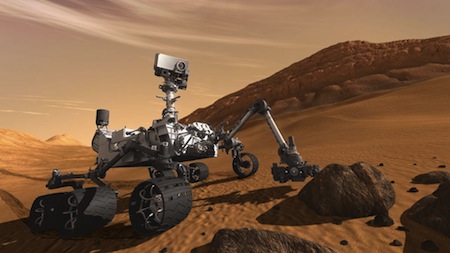 Life Sciences
Life Sciences
 Physics, Earth & Space
Physics, Earth & Space
Another Mars Rover, Another Chance for (Materialist) Redemption

NASA is getting ready to land a new rover on Mars, this one to explore Gale Crater, one of the lowest elevation points on the planet and where water might have been expected to gather at some time in the past. The landing date is August 6 but there’s some drama likely to unfold for minutes or hours after as the space agency will lose its view of the rover during its perilous descent.
Good luck and best wishes to the plucky vehicle, which goes by the nickname Curiosity. Watch the genuinely exciting NASA video, “Curiosity’s Seven Minutes of Terror.”
Following standard procedure, NASA’s top Mars scientist, Michael Meyer, has been talking about, yes, the tantalizing possibility of finding evidence of life where once there was water. “One of the main reasons why we’re going to Mars is to figure out whether life ever started there,” he told Reuters. Since life as we know it requirers water, and since water flows down, Gale Crater is a logical place to look. But notice Meyer’s interesting if-then formulation:
If in the second place in our solar system that we think life has a possibility [it] actually did start there, my conclusion would be that life is easy, it’s a natural process and the universe is just littered with places that have life.
This would constitute redemption for materialist evolutionism. Curiosity will have the opportunity to investigate for the duration of one Martian year (687 Earth days). What if no evidence of life is forthcoming, as in fact has been the case with the previous Mars rovers? Would that incline Michael Meyer to the conclusion that life may not be “easy,” that perhaps it’s not a “natural process,” and probably the universe is not “just littered with places that have life”?
That, of course, is one of those questions you are not supposed to ask.
Image credit: NASA.
